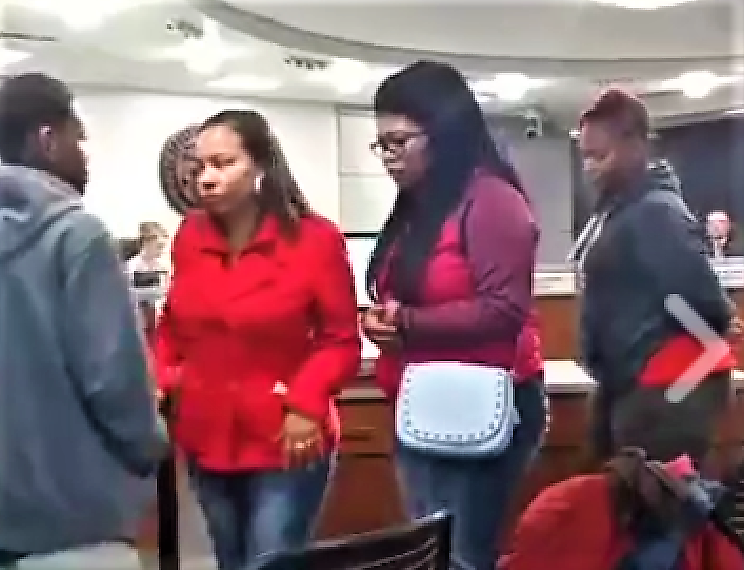It’s been over a week since five African-American boys, age 12 to 14 years, were stopped at gunpoint by a police officer as they walked home from playing basketball at the Kroc Center on Division in Grand Rapids. IKeshia Quinn, a mother of two of the boys, believes that “Nobody else their age should have to go through this.” The officer called for backup which resulted in at least six guns being drawn on the boys as they lay down on the ground, hands behind their heads.
Shawndryka Moore added, "I try to get back to living and raising my kids without stress but that day just replays in my mind over and over ... the cry of fright that we heard from our boys as we watched the [body cam] video."
Exhausted
The mothers of the boys involved, Quinn, Moore, and Jacquetta Sims, are feeling exhausted after the incident itself and the resulting media coverage and political commentary. They've had a meeting with the Grand Rapids police chief. “This is not politics for us. This is our life in our homes everyday.” Sims added that right now she has "a lot of ill feelings" about everything that's happened, but “I’m trying to understand so I can work to make change. I don’t want to stop until we can change some things going on. I will be at every City Commission meeting asking if they’re going to change the protocol.”
Moore added, "What if one of those boys would have made just one wrong move? Then would they still be okay with the protocol, even though our boys were totally innocent?"
Sims continued, “My husband and I watched a video where a person was simply asked, ‘We have reports that you might have a weapon.’” Sims wondered what it would have taken for her boys to be approached as kids who would have wanted to help, rather than having a gun drawn on them right away.
The mothers say they are now “more overbearing” as parents. “When they want to play basketball, we say we need to go with them.” The boys don’t always appreciate it, but the parents aren’t sure what else to do.
Bomesa Sims, husband to Jacquetta added, "I want [the Chief and officers] to know the environment they're creating is unstable. I watch my boys everyday. I'm with them everyday while they play basketball and all. We've seen the police all the time at busy intersections. They used to pay it no mind. And now they watch - every time they hear the sirens - they stop playing basketball and look to see what the police are doing.
He went on with a message to the community, "It's important to fight injustice and not weigh in just when it hits our doorstep. This is not just a moment - we will keep fighting. We want this community to be safe not just from predators but from the police."
What the community can do
To those community groups who would like to help, the mothers would appreciate support in asking for respect, an apology, and further community action. (Community organizations have created an action page for those who want to show support.)
The mothers are also asking for support as they call on decision-makers to take a good look at protocol. “There should be a different protocol at their age,” said Quinn, meaning the young ages of their sons.
All three mothers say they don’t know all the answers but something has to change. “[The police] look at all of us the same. There’s all kinds of races doing different things, but our race is the most targeted by police,” said Sims. “The officers need to go through [more] cultural sensitivity training, so they know us," and what the Black community has to offer.
It has been suggested that the mothers organize a day in the park with police officers to build community, but Moore responded, "That doesn't take away what happened or the fact that the ways things are set up these days just has to change." The mothers would appreciate building relationships in a different way.
“Our boys need to hear, in person, ‘I’m sorry, but this is why we had to do what we did,’” said Sims. The families would like the conversation to continue from there.
Quinn said, “For the boys, everything changed that day. They were scared and they didn’t want to die.”
This article has been edited to clarify and add quotes from the parents involved.
The Rapidian, a program of the 501(c)3 nonprofit Community Media Center, relies on the community’s support to help cover the cost of training reporters and publishing content.
We need your help.
If each of our readers and content creators who values this community platform help support its creation and maintenance, The Rapidian can continue to educate and facilitate a conversation around issues for years to come.
Please support The Rapidian and make a contribution today.
